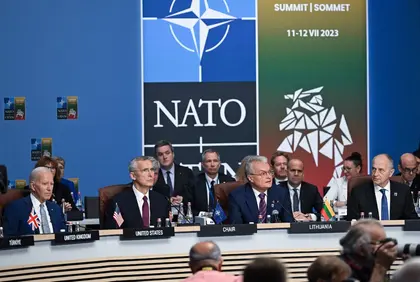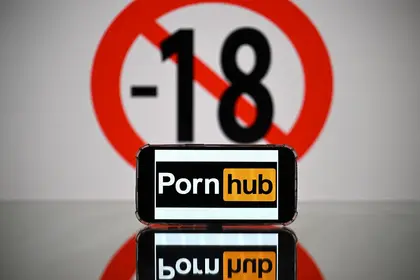“Ukraine’s future is in NATO,” alliance members reaffirmed in joint declaration at the summit in Vilnius on July 11, promising the same they had promised many times since 2008: To keep the door open.
My concierge Nelia was watching the news all day and cried during President Volodymyr Zelensky’s speech in Vilnius earlier that same day.
JOIN US ON TELEGRAM
Follow our coverage of the war on the @Kyivpost_official.
“Today I embarked on a trip here with faith in decisions, with faith in partners, with faith in a strong NATO. In a NATO that does not hesitate, does not waste time, and does not look back at any aggressor,” he said in front of a huge rally waving Ukrainian and Lithuanian flags, as Nelia watched in her concierge’s storage room, where she has a small TV set.
- Find the most current war in ukraine update in the Kyiv Post’s daily news reports published today.
- Receive the latest Ukraine news bulletins for today.
“I wish they had accepted or invited us,” she said still wiping her tears away after the President’s passionate speech. “I thought it was possible that the war would end if they did. But it will last longer.”
Many Ukrainians have been following the NATO summit preparations this year nurturing the hope that it would make the future of our country clearer. Thousands of brave men and women proved their commitment to democracy and independence at the front line.
The summit in Vilnius could have brought some sign that the Alliance sees and understands this. But the thin communique was too diplomatic and disappointing for many.

‘We Are Blocking Propagandists’ – Zelensky Imposes Sanctions on Pro-Russian Politicians
“We wanted it to be an engagement and to announce the wedding date. And it turned out that we’ve been hung out in the friend zone,” says Anna Natalushko, 39, a Ukrainian Chamber of Commerce worker, over the phone.
A pensioner Olha Yaroslavivna who walks her dog also “really hoped, that this summit would speed up the end of the war, that we would be like West Germany, which was in NATO as part of Germany.”
What she points out is a legal difficulty: to accept Ukraine in NATO in the territories of 1991, when we gained independence, while Russia is occupying around 17% of the country. Acceptance of the whole of Ukraine means direct confrontation with Russia, which has tried to officially obtain recognition of its seizure of the territories it has occupied. But such acceptance would mean the official division of Ukraine.
“As President Biden noted, bringing Ukraine into the Alliance now, here in Vilnius, would bring NATO into war with Russia. Also, Ukraine has further steps to take along its reform path,” confirmed US National Security Advisor Jake Sullivan in Lithuania.
Western partners have repeatedly pointed out that modernization of the country, including the fight against corruption, is among the main tasks for Ukraine’s progress toward the EU and NATO.
“I understand that joining NATO is like putting a carrot in front of a donkey to get things moving. I hope it will happen after the war,” says Vitaliy, a Kyivite of around 50, who walks his dog in the evenings and prefers not to share his last name.
Natalushko, who has spent the entire war in Kyiv, sees the lack of specifics and vague NATO promises as a “bad sign” that Russia could take as weakness.
“Even missiles and aid look like a consolation prize at the NATO summit this time,” Natalushko underlines her disappointment via the phone.
But not all Ukrainians share the disappointment. Some had not expected crucial decisions. “I understand that NATO will accept Ukraine only after the war. I was not hopeful because there were many requirements and objective obstacles,” says Oleksiy, 25, a younger Kyiv resident who walks his Beagle Teddy.
According to recent polls, 89% of Ukrainians support joining NATO. However, an invitation does not mean immediate accession or the application of Article 5. The gap between invitation and accession could take years, but it would send a much stronger signal to Ukrainians who are confronting Russian aggression on a daily basis.
“The longer we are not accepted into NATO, the more chances Russia sees for a long and exhausting war,” Natalushko thinks. “Our strong Western allies have to decide whether we should join NATO, but it is Ukraine that is and will be attacked.”
You can also highlight the text and press Ctrl + Enter










